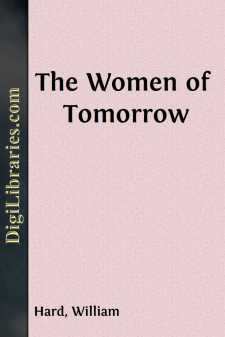Categories
- Antiques & Collectibles 13
- Architecture 36
- Art 48
- Bibles 22
- Biography & Autobiography 813
- Body, Mind & Spirit 142
- Business & Economics 28
- Children's Books 17
- Children's Fiction 14
- Computers 4
- Cooking 94
- Crafts & Hobbies 4
- Drama 346
- Education 46
- Family & Relationships 57
- Fiction 11829
- Games 19
- Gardening 17
- Health & Fitness 34
- History 1377
- House & Home 1
- Humor 147
- Juvenile Fiction 1873
- Juvenile Nonfiction 202
- Language Arts & Disciplines 88
- Law 16
- Literary Collections 686
- Literary Criticism 179
- Mathematics 13
- Medical 41
- Music 40
- Nature 179
- Non-Classifiable 1768
- Performing Arts 7
- Periodicals 1453
- Philosophy 64
- Photography 2
- Poetry 896
- Political Science 203
- Psychology 42
- Reference 154
- Religion 513
- Science 126
- Self-Help 84
- Social Science 81
- Sports & Recreation 34
- Study Aids 3
- Technology & Engineering 59
- Transportation 23
- Travel 463
- True Crime 29
The Women of Tomorrow
by: William Hard
Description:
Excerpt
WHENCE AND WHY
The chapters of this book were originally articles in Everybody’s Magazine. I have not embellished them with footnotes nor given them any other part of the panoply of critical apparatus. It could be done. I have preferred to leave them in the dress I first gave them,—a fighting dress. They owe much of their structure, it is true, to facts and ideas out of the dust of libraries. But they owe much more to facts and ideas exhumed out of the much more neglected dust of daily circumstance. Either dust, by itself, is lifeless. When the two cohere they establish the current of existence. At their meeting-place this book has tried to stand. And so, while it hopes to have added to knowledge, it will have failed unless it has merged into conduct.
The reader will forgive the abruptness of the shift of attention from the subject of one chapter to the subject of the next. Each chapter, because of having been a separate magazine article, is still an isolated unit. Its isolation, however, is only that of form. In thought there is a sequence both logical and temporal.
Devoting themselves to five critical phases in the mental development of the modern woman, the five chapters of this book accompany her through five successive stages in her personal life. The postponement of marriage, the preliminary period of self-support, the new training for motherhood, the problem of leisure, the opportunity for civic service,—these subjects, treated in turn, follow one another in the order of their appearance in a normal life-history. They are further unified by the proof (I hope it is proof) throughout adduced that even the most diverse of the phenomena observed, the female parasite equally with the female suffragist, the domestic-science-and-art enthusiast equally with the economic-independence enthusiast, are all of them products of the one same big industrial unfoldment which is exposing all women, willing or unwilling, to the winds of the social process, which is giving to all women, whether home-keepers or wanderers, in place of the old home-world, the new world-home.
William Hard.
Chicago, Dec., 1911.
The woman of to-morrow will not differ from the woman of yesterday in femininity or physique or capacity, in her charm for men, or her love of children, but in the response of her eternally feminine nature to a changed environment. The environment is bound to alter the superficial characteristics of woman as every change has done. Man, in his turn, will be a beneficiary of this new womanliness as he has been the ready victim of the old-womanishness.
The reader will find in this book a dramatic picture of the gap between girlhood and motherhood which causes both girls and men to go wrong, and which can only be filled adequately by work—work even more suitably performed after marriage than before. Postponed childbearing, if not postponed marriage, is justified by the superiority of the younger children or the children of older parents. A declining birth rate may be redeemed by a declining death rate and the superior progeny of mature marriage....


